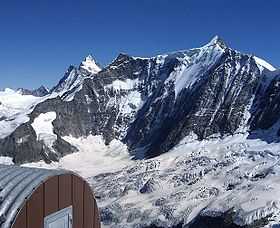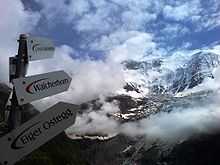Gross Fiescherhorn
| Gross Fiescherhorn | |
|---|---|
 The north face (Fiescherwand) of the Fiescherhorn | |
| Elevation | 4,049 m (13,284 ft) |
| Prominence | 398 m (1,306 ft)[1] |
| Parent peak | Finsteraarhorn |
| Location | |
 Gross Fiescherhorn | |
| Location | Bern/Valais, Switzerland |
| Range | Bernese Alps |
| Coordinates | 46°33′05″N 8°03′40″E / 46.55139°N 8.06111°ECoordinates: 46°33′05″N 8°03′40″E / 46.55139°N 8.06111°E |
| Climbing | |
| First ascent | 23 July 1862 |
| Easiest route | Basic rock/snow/ice climb |
The Gross Fiescherhorn is a mountain in the Bernese Alps range of the Swiss Alps. At 4,049 metres above sea level, its summit culminates over the whole Fiescherhorn massif, which is also composed of the slightly lower Hinter Fiescherhorn and Klein Fiescherhorn. From the north both are well hidden behind other mountains and can only been seen from the village of Grindelwald (1,034 m).
Ascents are usually made from one of these three popular routes: one starts from the Mönchsjoch Hut, one from the Konkordia Hut, and the third from the Finsteraarhorn Hut.
Climbing history
The summit was first reached on 23 July 1862 by H. B. George and Adolphus Warburton Moore, with guides Christian Almer and Ulrich Kaufmann. They used what is now the normal route, the south-west ridge.[2]

The north side of the mountain was first climbed in 1926. On 13 August, W. Amstutz and P. von Schumacher reached the summit after a 15-hour ascent via the north ridge, which is the northern boundary of the Fiescherwand.[2]
The first direct ascent on the Fiescherwand was made by W. Welzenbach and H. Tillmann in 1930. Welzenbach was an expert climber, who disputed the common idea of his time that an ascent of the Fiescherwand was impossible. The previous year, in 1929, Welzenbach and Tillmann climbed the north ridge in only 8.5 hours.[2] The following year they started the ascent of the Fiescherwand on the morning of 5 September 1930, taking a line that ran directly to the summit. They reached the top that evening, after a 12-hour ascent.[2]
References
External links
| ||||||||||||||||
| |||||||||||